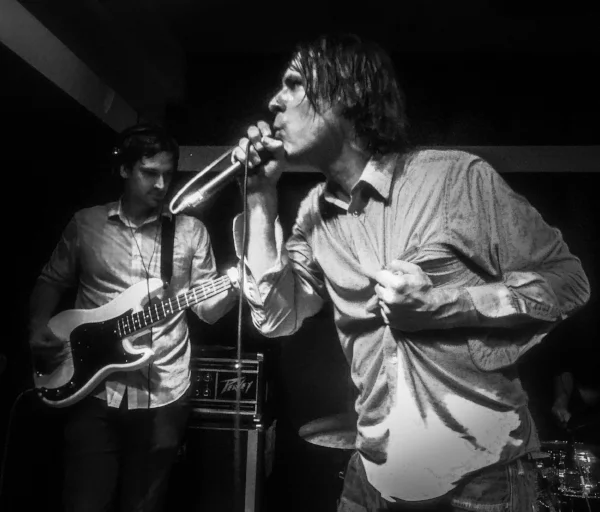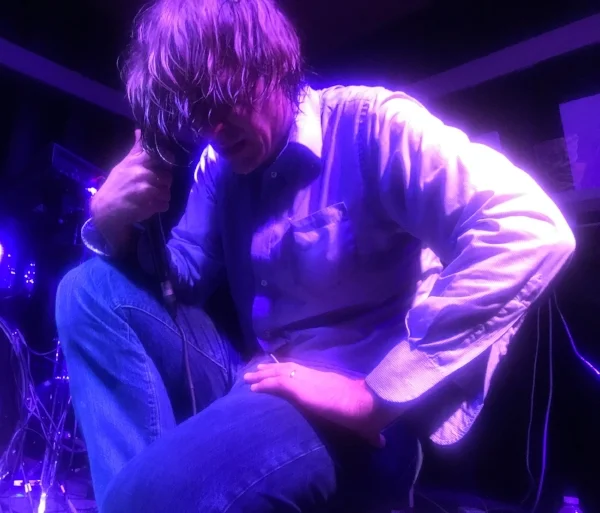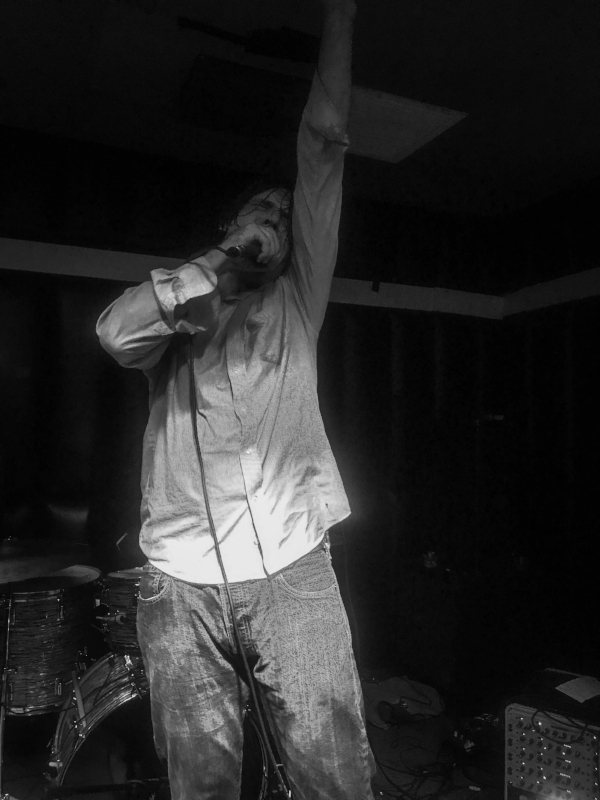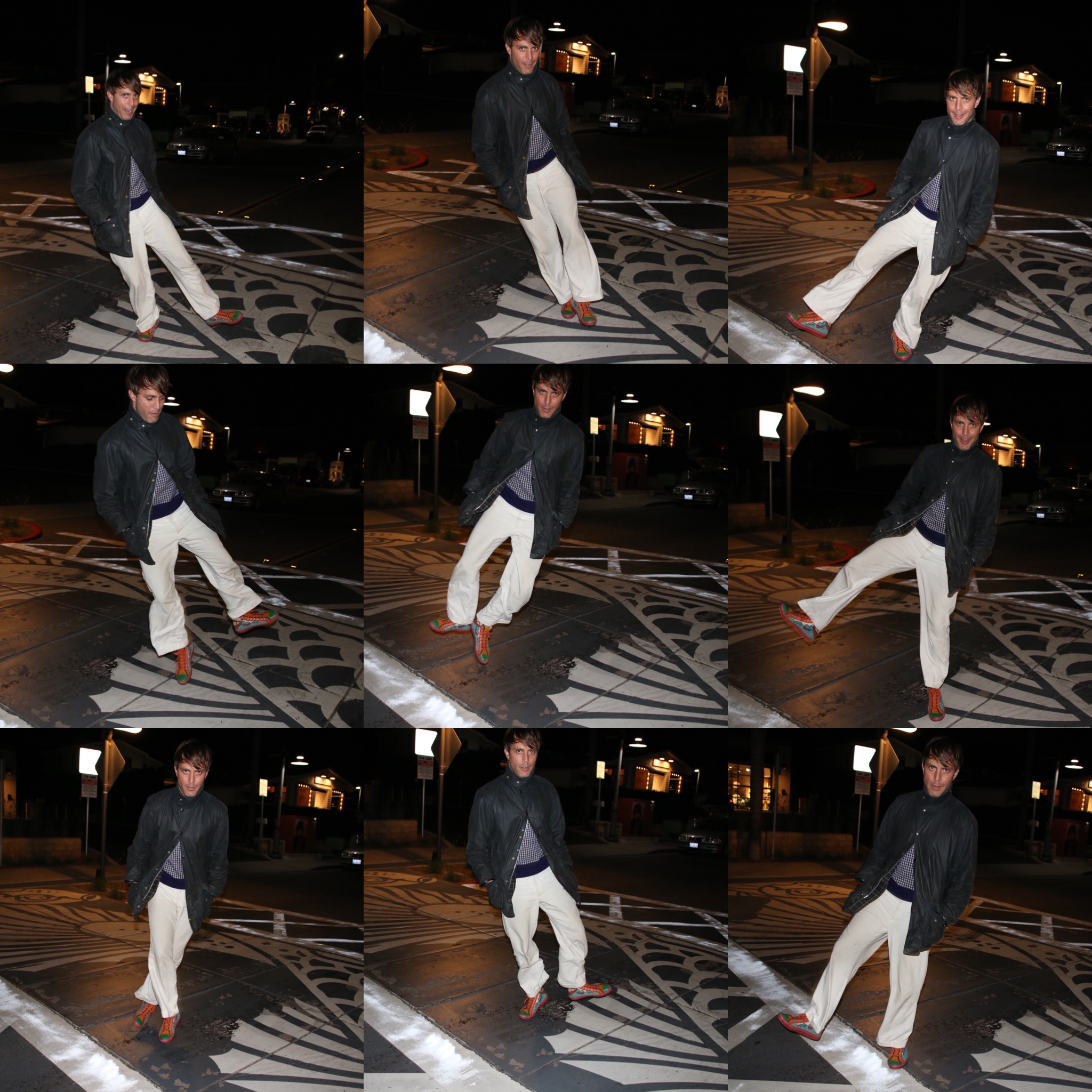John Maus on Music, the Minnesota Milieu, Quantum Leap, and More
John Maus is one of the key and most-celebrated figures in our music world here at Weirdo Music Forever, so 2017 has understandably been a remarkable and delightful one on the Maus music front for us. First, there's the new album, Screen Memories (Ribbon Music, released Oct. 27). Second, Mr. Maus is touring again (with a band!), bringing his legendary kinetic shows to cities throughout North America and Europe. And as if this weren't already more than enough, Ribbon Music announced earlier this year that it will release a 6-LP box set (comprised of his earlier albums, as well as a previously unreleased twelve-track studio album Addendum) in the spring.
We recently caught up with John Maus after a sold-out show in San Diego (some show-goers confirmed they had driven over six hundred miles to attend), and then again the following day right before his rousing Desert Daze performance, which was one of the festival's highlights. John graciously shared his thoughts on his doctoral dissertation, the Minnesota milieu, Quantum Leap, and much more.
Bobby Weirdo: I wanted to talk a little bit about your dissertation, Communication and Control. Are we controlled by our devices?
John Maus: I think it all depends on how they’re used. You can properly use these things. I wouldn’t suppose I know how to use them in the right way, but that’s punk rock, right? I like the idea of the misuse of WWII equipment – the mixing boards, the tape decks, the scramblers, and the vocoders were essentially part of a military surplus. Then you had all these teenagers "misusing" them, and I like that idea.
BW: You picked interesting musicians to reference in Communication and Control, including Franco Falsini/Sensations’ Fix, Puro Instinct, and Ariel Pink. Were those references close to your heart and mind because they’re people you know? I don’t know if you’ve worked with Franco, for instance.
JM: No, I haven’t worked with Franco, but I really felt like the melody [in “Fragments of Light”] represented the quintessence of the thing to a degree - the way it’s fragmented -juxtaposed with Mahler’s Unfinished 10th.
With Puro, I had already done that work in relation to that song ["Can't Take You Anywhere"]. I had looked at how the various melodies they were playing outlined this quasi Roman numeral thing. You could do it that way if you wanted to, but that was to miss the point.
And then with Ariel, it was close to mind at the time because I had just heard those songs [on Pom Pom], and I was already thinking about it.
BW: You studied at CalArts, then went into composing/recording/performing music full-time, and then disappeared from the public while you were doing your dissertation and Ph.D. work. Now that you’ve come back to music publicly, how does your academic background interact with your live performances?
JM: Prior to this release [Screen Memories], which involved that six-year hiatus, I would have said it didn’t interact, save for talking about if after the fact [when] I could bring some of these ideas to bear. But maybe [it does] more explicitly this time, after having sunk two years into reading and writing. I think that’s the reason for better or worse that I etched all the circuit boards. It was under a misguided belief that I needed to be in complete command of the media involved in order to adequately mobilize its possibilities.
BW: You’ve spoken before about a radical new way of talking about music. How do we do talk about music in a radical new way?
JM: I don’t know, and I said this then. It could be that you’re already doing it, for example. There are only so many hours in the day – do you know what I mean? I haven’t had a chance to really dig deep into it. The point I was making is that at least in the little ivory tower that I’ve been living in, it’s all these folks from the post-war generation.
I just came across something that Kittler wrote about rock ‘n roll and Pink Floyd of all people. Another essay that comes to mind is Foucault’s Theatrum Philosophicum in the brief passage about Warhol. Again, this is a post-war guy and [it was] a situation different than our own, but maybe there are insights there. I don’t know – maybe there’s shit I don’t know about, where people are already doing this.
BW: You bring up Kittler. Are the five functions of Information Theory part of the process you have as a composer, recording artist, and performer?
JM: That’s what I’m saying – this time around, it was guided by this idea of positive feedback. Making the media itself in its medial dimension a part of the expression. It’s something we’ve already been doing, but maybe not so consciously. Like mobilizing the consummate tape deck - with its limited bandwidth, the wow and flutter, and the harmonic distortion - as a creative instrument. All that was consciously done more than ever this time around. I had hoped to achieve some sort of grand synthesis, like some sort of hi-fi/lo-fi thing, and I don’t think I really managed to do it.
Again, that was the idea of etching all the circuit boards. It wasn’t just going to be the 70s all over again. I was hoping to somehow control it with a computer. But here, the fixation is purely on the timbral, sonic dimension of it, and not so much the musical one. And you can run into trouble with that, because then why not just make noise if your focus is exclusively on the timbre or tone color?
BW: "Quantum Leap" is a song title on We Must Become the Pitiless Censors of Ourselves, and the TV show is a topic in Communication and Control. Are both of these the same Quantum Leap?
JM: Yeah! I’m surprised and happy you asked me that, because nobody ever has. I don’t understand it, because it would have been so obvious that’s what I’m talking about. Quantum leap, like "we made a quantum leap"? No – I’m talking about the show with Scott Bakula from 1989!
I love that show, because there’s something unsettling or uncannily true about the idea that we could travel in time, but the limitations on that would be that it would only be during our own lives. That’s a new note in the canon, is it not? And then the whole ordeal of every time you look in the mirror, it’s not your own reflection, and the only person who knows who you really are is a hologram that only you can see and hear. All the ingredients are there. I tried slightly unpacking it, but I don’t think I’ve unpacked it enough - how correct that really is. Who’s the producer of that - Bellisario? I’d love to pick his brain about it. He’d be the one who could explain where he came up with it. I think he was a Nam Vet.
BW: That character type that Scott Bakula plays surfaces a lot in his shows. There are some similarities with Thomas Magnum in Magnum P.I.
JM: Yeah! Magnum did a whole thing with a spider. Do you remember that one? He’s trapped on the island, underneath the plane, and he goes crazy and talks to a spider.
Suzy Weirdo: Did you live in Hawaii?
JM: I did for two years, in Honolulu. That’s a magical place. Have you ever been?
SW: I have. It’s like paradise.
JM: It is paradise. That’s on Pitiless Censors. Wherever you are, it comes into the work a little bit I think. The place finds its way in.
BW: I’ve always been curious if there is something about the character of Minnesota that is important to your art.
JM: I think so. There’s something about the way I labor after it that is part and parcel with a kind of bland, cultural inclination in the milieu that I come from. I return to that theme, because you have Ariel out here on the West Coast singing about “West Coast Calamities”, and I love that, but I do the North Star, and the snow, and all that.
That documentary, The Idea of North, by Glenn Gould is all about solitude and the appeal of hearing the wind in the grass instead of helicopters and the trash men. There are moments of magic and it's that appeal. You get the aurora borealis even as far south as we are. The Arctic Circle has always held a fascination for me. The first time I heard The Idea of North, I thought, “Wow – I get that; I understand it.”
Hopefully there's the sense of place [in what I do] in addition to the work ethic. It isn’t showy; it’s frugal, humble…these sort of adjectives, to whatever extent they apply to what I’m doing.
BW: Speaking of Ariel Pink, I’ve heard that you might work on a collaborative album with him at some point in the near future. Is that a possibility?
JM: Yes. We’re both swamped right now, signed up for the long run for the next couple months, but I’ve been talking about it for a long time, and he’s been talking about it. It’s just a question of finding the right moment, which I think will be after this.
Watch John Maus videos, pre-order music, get tour dates, and more here.









